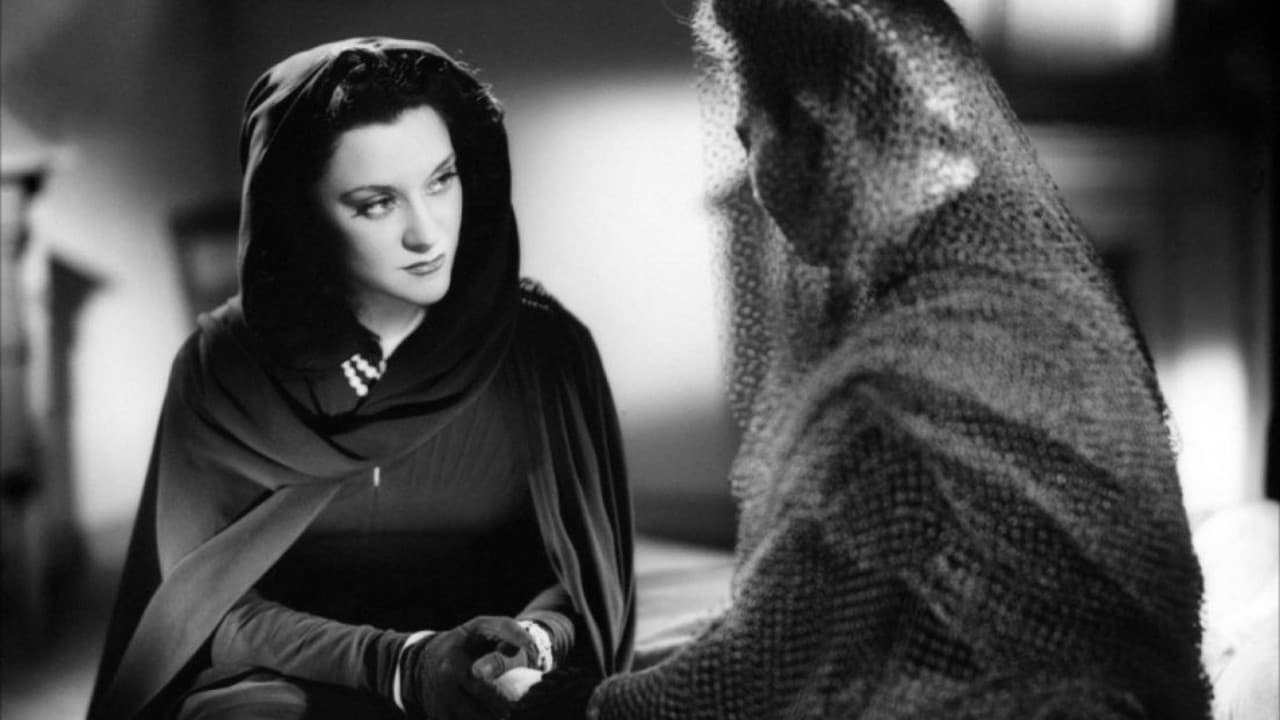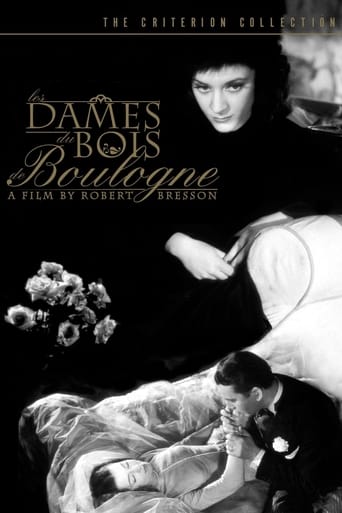

People are voting emotionally.
... View MoreI really don't get the hype.
... View Moredisgusting, overrated, pointless
... View MoreA clunky actioner with a handful of cool moments.
... View MoreBresson's second feature film, the plot is as simple as this: a woman takes revenge to her ex-lover by coaxing him into marry a young girl with an ill reputation, but the movie emanates a classical elegance through a meager four-player game. A young socialite Hélene (Casarès), sensing that the romance between her and her lover Jean (Bernard) has plateaued out, weasels her way into the latter's blithe confession by feigning that she wants to take a step back from their liaison, a cunning move to elicit the truth without staging a scene, in fact, she completely gains Jean's trust and admiration by her ostensible munificence and sensibility, little does he know, the tidings is a hammer blow to her. The best cure to overcome a broken heart is to retaliate, so Hélene plumps for a limber and comely cabaret dancer Agnès (Labourdette) as her bait to inveigle Jean into the trap, while keeping both oblivious of her true motive and the nexus is to keep a lid on Agnès' demimonde background from Jean until the wedding day. The whole plot is trenchantly actualized by a concatenation of conversations between various parties, playing up verbal interaction as an engaging fencing contest. Bresson lays bare its psychological signification through his able players (his last film cast by professionals). An inscrutable Maria Casarès oozes a stunning sophistication well beyond her age, every line she delivers can be savored with connotations ranging from manipulation to circumspectly veiled threats (dialogue is supervised by none other than Jean Cocteau), she revels in subtle moderations of her countenance and never lets up into theatricality. Elina Labourdette's Agnès, by comparison, guilelessly wears her hearts on her sleeve and makes heavy weather of her resistance from Jean which belies her abject capitulation in the first place, there is no reason for a young girl balks at a suave suitor like Jean if not for her ignoble past, and Paul Bernard gaily epitomizes a man's naiveté and predictability despite the fact that it is after all, him who has the say-so in the fallout, not these two polarized lollapaloozas from the opposite sex, or Lucienne Bogaert's Madame D., Agnès' careworn mother. A microcosm of our patriarchal hierarchy is under Bresson's sober scrutiny here. The ending is tinged with romanticism (through the illumining light on Agnès' impeccable visage), resuscitated by love over prejudice, the pair might indeed obtain true happiness after the event, the film sends a liberal-minded message and bears testimony of Bresson's aptitude of grappling with something ablaze with connivance, melancholy and lachrymosity, a rather disparate frontage, but not entirely less crafted, in juxtaposition with his more distinguished and groundbreaking masterworks.
... View MoreI love French films, so the reason I did not love this film is not because I have anything against them. I also have really loved the films of Jean Cocteau, though his dialog here seems more like something from one of his fantasy films (like BEAUTY AND THE BEAST or ORPHEUS). The reason why I felt so unimpressed by this particular film was because I found the story and the dialog so thoroughly impossible to believe. None of the characters seemed like real people--just characters from a very, very old fashioned novel.Hélène and Jean have been dating for two years. However, neither feels much passion for the other. When Hélène tells Jean, she is angered to find that he, too, feels the same. Why this makes her angry is anyone's guess--I suppose that she had to be the one who was bored and his also being bored was a betrayal (at least in the bizarro world where they both live). So, instead of just accepting this minor inconvenience, Hélène spends the rest of the movie concocting a convoluted plan to break Jean's heart. To me, the motivation, money and payoff just made no sense at all--it isn't like Jean raped her or ran over her dog! He, like Hélène, just realized that their relationship had run its course.In this convoluted logic, Hélène arranges for a cabaret dancer, Agnès, and her mother to move into an apartment together. Hélène then deliberately introduces Jean to Agnès--somehow magically knowing that he'd fall head over heels for her and show the romantic ardor of some 19th century tragic hero (not a real man). Well, Agnès hates men and so Jean is crushed--but continues to stalk her even though they'd only briefly met once. Does this make sense? Nope. But by the end, the machinations of Hélène result in an ending where Agnès is about to die (why, I have no idea) and is only rescued by Jean's love.As you can probably tell from my summary, none of this sounds very realistic and how Hélène KNEW Jean would fall for Agnès so completely makes little sense. Nor does the dialog which sounds like it comes from a very, very bad romance novel written about 1920. Despite nice cinematography, a hopelessly unbelievable story that's only good as a time-passer.
... View MoreMovies that are pre-sold as 'classic', 'masterpiece', etc nearly always have a tough row to hoe to live up to the hype. I've seen only a handful of Bresson movies and the only one I am happy to concede is a masterpiece is Au Hasard, Balthazar, the others are just a heavy mixture of the static and the obscure. This is no exception. Throughout I had the feeling I was watching cyphers rather than real people. There seemed to be no real reason for 1) a popular prostitute to quit the profession and 2) accept the largesse of another woman. The fact that the prostitute is the least-likely looking hooker that ever came down the Pike is another factor as is her mother's acquiescence/acceptance. The air of unreality doesn't help much either if anybody asks you. Strange to think that when a far superior film, the Carne-Prevert Les Portes de la nuit, tried to mix fantasy with realism within months of this entry it was laughed off the screen and took several years to be acknowledged as the gem it is. This is one to see if you're a Bresson completist otherwise give it plenty of room.
... View MoreDisappointing on a couple of major fronts, as a Bresson film and as a Cocteau script. This was Bresson's second film. Five years later, he made the first film in his signature style, Diary of a Country Priest. Dames is much more conventional in its style and content. A society woman tricks her former lover into falling in love and marrying a former cabaret dancer (a Hollywood-like front for prostitution). The film is pretty, but dull as Hell. Elina Labourdette, who plays Agnes the dancer, is excellent (and she sure can dance), but the rest of the cast is lifeless. I can't believe Jean Cocteau worked on this script. For curiosity's sake only. 5/10.
... View More